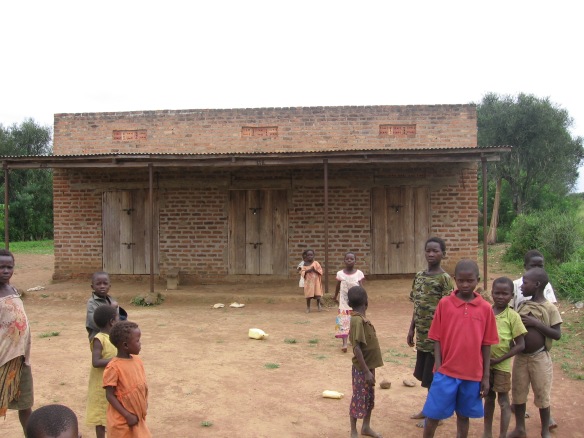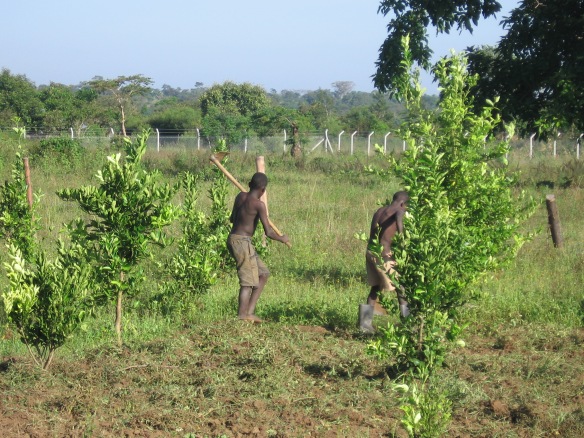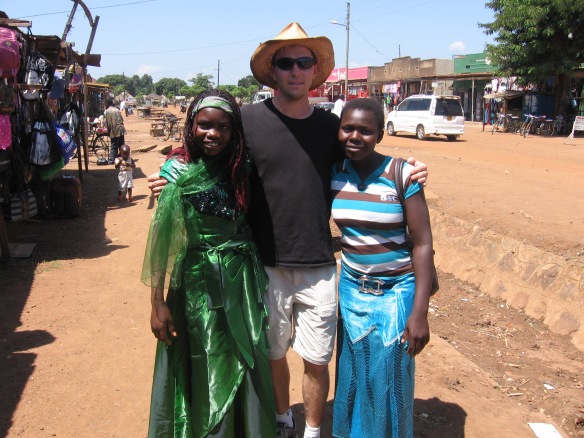Isn’t Jesus the answer to the problems in a third world country? Let’s teach them about Jesus and that will solve many of their problems. Wealth isn’t the answer to their problems. I don’t want to make the American standard of living their standard of living. I battle against the need to keep up with the Jones’ every week. Is starting a school going to help them?
That was my thought process while Brad was in Uganda. I’m a huge fan of education, but I kept wondering “Why build a school?”
I’ve gathered several reasons while listening to Brad talk about his time in Uganda.
1. The Bible commands us to care for orphans, widows and the poor. With the established CarePoint, the children were being cared for with a meal six days a week of posha and rice and some Bible teaching. We wanted to do more for them, and a school is a way to do that. Whether we see amazing results from it or not, we are obeying the command to care for the poor and orphaned and maybe even widows through providing them with jobs.
2. Lodging –
This is Alex. He is about ten years old. His dad recently died, and his mom is either dead or who knows where. He lives with his aunt and six cousins.  The left third of this building is where Alex sleeps. He uses the mat Brad is holding in the above picture and has a mosquito net. The aunt sleeps in half of this section and the seven kids sleep in the other half. Brad thought it was similar to the size of a pickup bed.
The left third of this building is where Alex sleeps. He uses the mat Brad is holding in the above picture and has a mosquito net. The aunt sleeps in half of this section and the seven kids sleep in the other half. Brad thought it was similar to the size of a pickup bed.  Brad gave Alex a toy car and some pictures of us but worried that was going to cause problems for him with his cousins. We would be happy to give Alex a bed and more clothes, but it would likely all end up going to his uncle or to others in the family. With our boarding school, Alex can have a bed in a larger room, can stay year round and have a few of his own things.
Brad gave Alex a toy car and some pictures of us but worried that was going to cause problems for him with his cousins. We would be happy to give Alex a bed and more clothes, but it would likely all end up going to his uncle or to others in the family. With our boarding school, Alex can have a bed in a larger room, can stay year round and have a few of his own things.
3. Food – These children eat posha, which is like a corn meal porridge, and rice almost all the time. Although they live in a tropical climate, they eat very little fruits and vegetables. Now that there is five acres with a fence around the school land (to keep others from helping themselves), we’re hoping to grow and raise different types of food for them to eat. Learning how to garden and care for animals could be a valuable part of these students’ education. Someone already planted orange trees and these boys worked hard at weeding them.

4. Education – I wonder how often some of the kids get to the public school. In a letter Alex wrote us, he said through an interpreter “…my guardians mistreat me a lot they don’t cloth me. Because of this I fail to go to school. At school they need children to put on school uniforms which I don’t have so this has denied me the chance of studying and my life is in ruins.”
Sponsors of older girls in Kayango are paying so the girls can go to private schools, largely for the girls safety. Sending them to private schools is expensive, and they’re required to take certain things and have certain clothes. Brad and James took 14 girls and 4 boys shopping to get them clothes for private school. I’m not sure if the green dress in the following picture is for school or just for fun.

Brad said the private school students knew English, but the students in the public schools did not speak English even though English is Uganda’s national language. Public school classes have around 100 students to a teacher. We’re hoping to have 25 students in a class at our school.
5. Jobs – We’re starting with just a primary school but hope to have a secondary school someday. The focus of the secondary school would largely be vocational training. You’d be shocked at even the basic life skills most Ugandans need to learn.
At the same time, the school will create many jobs for people in Uganda.
6. More time to learn about Jesus – At the schools students are in now, they’re learning some religion but it’s never certain exactly what. Our boarding school would obviously be different!
7. Basic living conditions – One great example for you: At some of the private schools students are given only five liters of water for an entire day to do whatever they need involving water – drinking, bathing, cooking, etc. Another school relies on rainfall, so in the dry season they have no water at all. James asked the kids if they would want running water in the new school, and they saw no need for it. Even without running water, they will have whatever water they need.
I’m sure there are other reasons I’m failing to mention, but my doubt about why we should build a school is no longer.
What do you think?

I think your church is awesome!! I really think the best way to reach the lost is to help meet their needs. Actions are much louder than words. If we preach about Jesus but don’t act like him why would anyone want to follow that? What a neat project! Are you going to go back with Brad sometime?
LikeLike
I am thankful for our church. I hope to go sometime with or without Brad!
LikeLike
Pingback: Africa Report : Education reform in Uganda 1997 - 2004 SocioLingo Africa